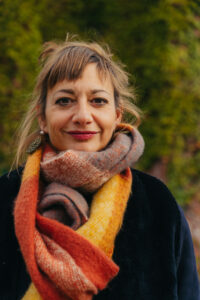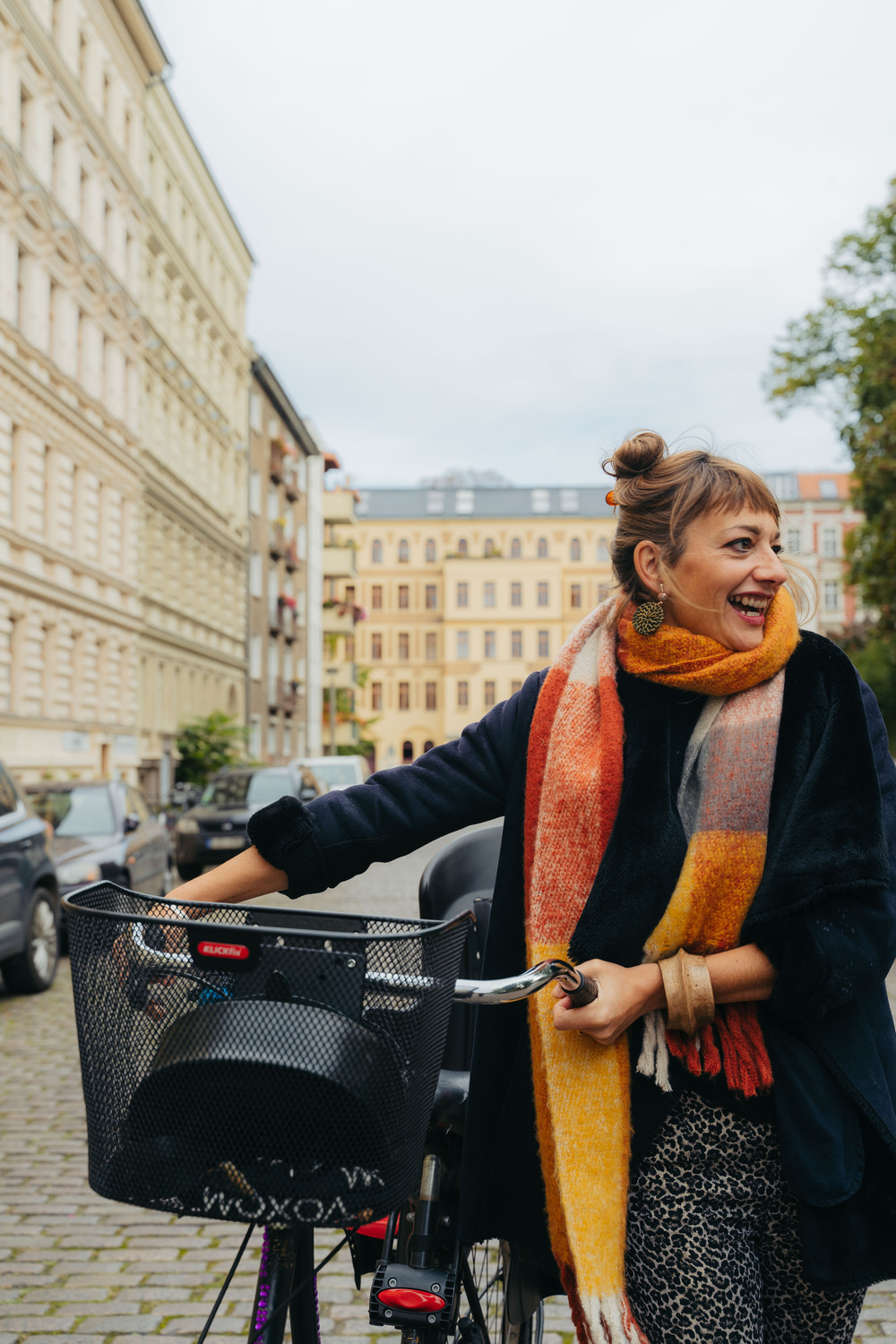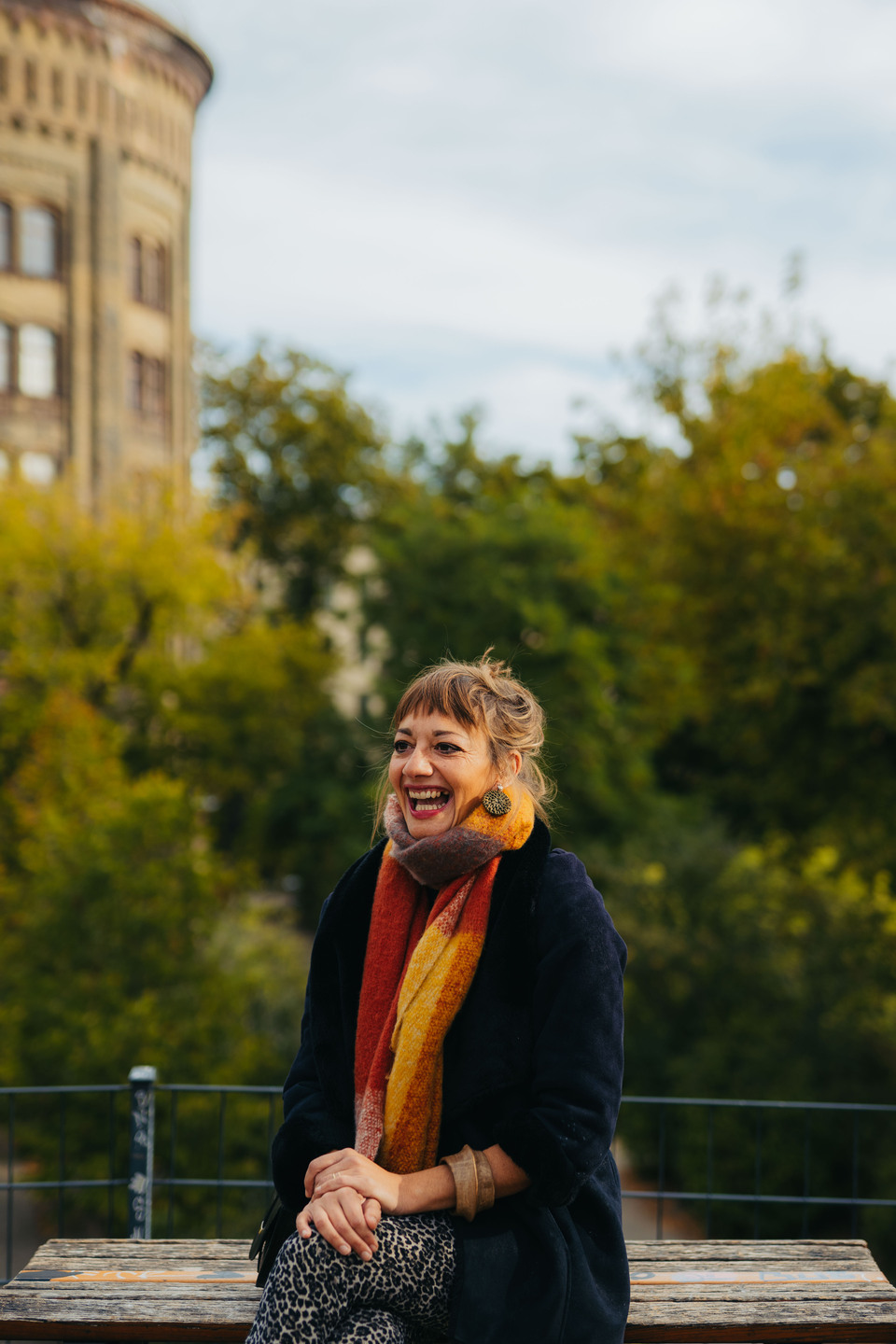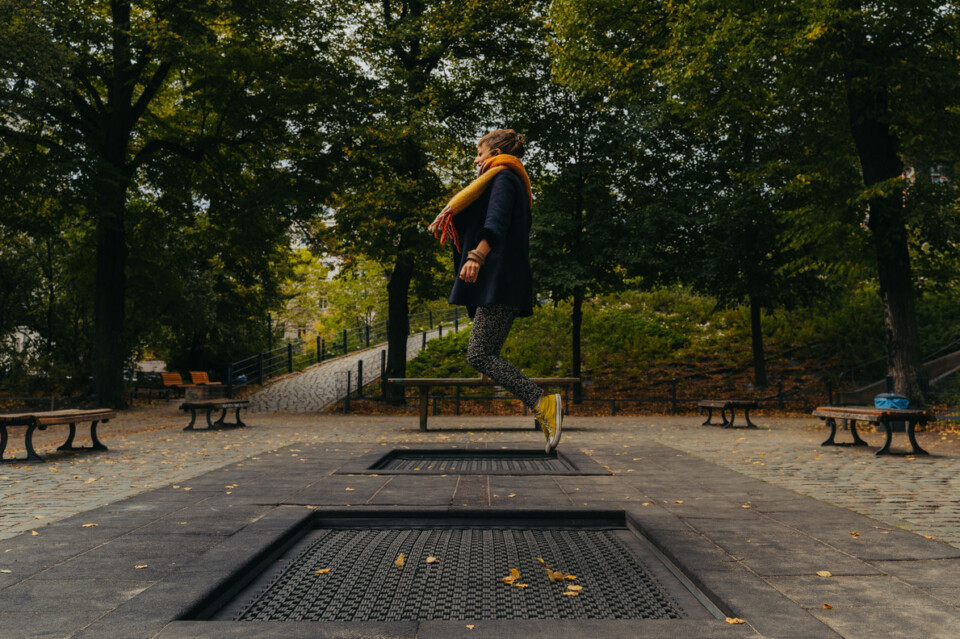P R U N E
Berlin | 2020

P R U N E
City — Berlin
Name — Prune
Age — 39
Love life — Partner & child
Profession — Freelance Reporter, Fiction Writer, Co-Founder and Editor-in-Chief of Sisters of Europe
Years in Berlin — 12
Location — Wasserturm Park in Prenzlauer Berg
T H E B E R L I N S T O R I E S
‘CURIOSITY ABOUT
EACH OTHER
IS DESPERATELY
NEEDED TODAY’

- What makes you happy? “Happiness does not exist for French women. Just kidding. As a Frenchie living in Berlin for more than a decade, I know how French women are both very much aware and a slave of this image of perfection that they have abroad. I’m not sure that the combination of ‘German’ and ‘women’ would sell as many books or films as those about the French do! French women want to look like they can have it all – five kids and still be very slim and have a fascinating job – but of course they can’t keep up with it. They finish alcoholic or on Prozac. Living in Germany made me feel even more French. I feel like I’m constantly going back and forth between two cultures, like having two identities. Sometimes when I’m back in France, things don’t look so familiar to me anymore and sometimes in Germany all of a sudden I don’t understand what they’re eating and why. I’ve always felt more European than anything else. I’ve lived in England, Spain, Budapest, Brussels, Cyprus and Paris and those experiences shaped my understanding of the world: it gave me a wider perspective, as well as an excuse to not really understand or respect the rules. Keeping a certain curiosity for the world around me and looking for similarities and differences keeps my mind awake.”
- What is your best personality trait? “I’m curious and not afraid to ask questions. Just like a child, I want to know how the world works and where people are coming from. Asking questions is part of my job as a journalist, but also a big part of my personality. Nowadays people tend to close themselves up a bit; they know what they know and think they’re always right. We’re living in a time where there is a crucial lack of dialogue. Some people find it very difficult to talk with people they don’t agree with. There is a lot of dismissal on social networks but also in the media: if you don’t think like me, I won’t talk to you. But we have to be more curious about each other. When you listen, you can always say, ‘I don’t agree with you’, and discuss things. It won’t kill you if you question or reconsider your own views. In French, we used to say ‘il n’y a que les imbéciles qui ne changent pas d’avis’, which means: ‘only fools never change their mind’. I don’t mind if someone is a right-wing extremist or a jihadist or has completely different ideas than me. I always want to go to people I don’t share my opinion with. I don’t want to judge, I want to understand. That’s how I ended up publishing my first non fiction book La Fille & le Moudjahidine in 2015, about a young refugee from Northern Caucasus, living in former Eastern Germany, who progressively radicalized himself and wanted to fight in Syria. I followed him during one year and a half, during which he struggled between the comfort of a western life in Germany and the temptation of the Jihad. Though we didn’t share anything – except maybe being two strangers in search of our identity in a foreign country – we became friends. The book came out 6 months after the Charlie Hebdo and the kosher supermarket killing in Paris and 3 months before the Bataclan. For me, it’s important to keep the dialogue open with people unable or unwilling to find their place in society. For example, what does this Jihad temptation say about the society we’re living in?”
- What is your greatest life lesson? “You cannot have it all. I grew up with the idea that I could have it all, but it’s not true. And you have to deal with frustrations and accept it. You have to learn that sometimes your love life is great, and your job is not going so well. Or when you feel on top of the world, you might be losing a person you love. Believing you can have it all is the biggest capitalistic bullshit. Not having it all isn’t bad, it just means that you need to adjust all the time. That’s life.”

- What is your biggest struggle? “Motherhood. This perfect image of motherhood reflected by society is completely fake. I never expected to experience such a big change in my identity and to feel so torn after I had a child. I had to redefine all the choices I had made in my life, that revolved around writing and freedom, my core values. Motherhood raises so many questions for me. Maybe I wasn’t prepared, maybe I was really stupid or too arrogant. I was at the end of my thirties when I had my child, not a youngster, I thought I would deal with it easy-peasy. Like nothing would change. What a joke. When a little person who needs you 24/7 enters your life, you have no other option than to drastically change who you are, what you think, what you want. And it hurts! I’ll never let anyone say motherhood is evident or natural. It’s not only a child that is born but also a new mother. In a way you have to say goodbye to the person you were before, and embrace your new role – but without losing who you were. It took me time to understand I hadn’t lost myself, I just added a new layer to my personality. I experienced that women face a lot of problems after they become a mum. It really shows the inequalities between men and women. Women still aren’t free in their decisions: how they give birth, either naturally or with C-section, if they want to breastfeed or not, stay at home or start working again after a week, if they want to live together with the father or not. There is a lot of judgment. In Germany especially motherhood ‘diktats’ are crazy. Women are often treated like children and being patronized by nurses, mother, society. They’re being told what to do by basically everyone. A man would never get criticised like that. There is still so much to change on this matter, especially because being a mother makes you feel vulnerable, because you’re fragile and overwhelmed.”
- What is your biggest dissapointment? “If you’re a control freak like me, it can be difficult that things aren’t always working out like you want and you have to adapt. Sometimes you do everything you can, and it just doesn’t work. That’s the catastrophe of life. We all at some point have to deal with great sadnesses or sorrow, and experience disease, loss or death. And once you’re almost 40, you have a pretty good range of experiences. But to me, disappointment is also very much linked to bitterness. And I think my curiosity prevents me from it, because there is great joy in life as well, and it balances out the shitty times.”
- What is the best advice that anyone ever gave you? “You can always go back. When you make a decision, don’t be afraid that it’s for life, or that you’ll lose everything. Nothing is fixed or definite, except for death. You can always take a step back, decide differently or change your mind. This advice from a neighbour made me stronger and made me take more risks.”
- What advice would you give to other women? “Trust in yourself is the key. It comes from education, your parents, your friends and anyone you admire. Having basic confidence might not help you achieve everything, but it gives you the strength to make your own choices and to stand for what you believe in. So you don’t necessarily do what others expect from you or follow the beaten path. Instead you find your own path, no matter how many obstacles there are. It’s also about taking risks. When I chose to leave Paris, I had a permanent contract and a new flat, but deep down I felt: this is not the life for me, I’m not happy. I was longing for something else. Leaving France felt like the right decision. Berlin had always been a bit of a dream. So I packed and left, at the beginning just for a few months. That required a certain courage or total in conscience, because it was during the financial crisis in 2008 and the media industry started to collapse. Everyone around me was saying: ‘Are you really leaving for Berlin? You don’t even speak German! What are you going to do there?’ Berlin at the time seemed like a place where nothing was established. It offered a freedom to become whoever you wanted to be. And as a journalist I was very interested in the post-Soviet world where two political systems were struggling to become one. Berlin was very affordable at the time. For a freelance journalist starting out, it was a great chance.”
- What is your ultimate goal or greatest goal? “I’ve learned that the more goals you have, the less likely it becomes you reach them. My dream would be to continue doing what I’m doing. I have always been in the fortunate position as a journalist to choose my topics and spend time on stories. I would like to continue writing because I love the freedom that writing gives me and it’s a part of me. But I also need to find a more sustainable way of living: motherhood makes me financially question this choice of freelancing. I have to make sacrifices, I’m still looking for the right balance.”
- What is your greatest sadness? “Dealing with absence, loss, death or separation from loved ones. My first experience with deep sorrow was when one of my best friends took her own life. She was from Sicily, a beautiful soul living and struggling to make her way in Paris, like me. We met and instantly became friends, she taught me to swear in Sicilian and we spent so much nice time in Europe together. I was 27 or 28 at the time she committed suicide and it was such a shock. I felt it was the exact moment that my youth and my lightness kind of ended. All of a sudden I had to deal with not just her death, but also the fact that she chose suicide. I was angry for a long time, I couldn’t understand it and I was ridden with guilt. You always keep wondering what you could have done, and why you didn’t notice anything. You have to accept that you will not always find answers to these questions. After living through something traumatic, you have to choose your camp: to decide to either fully enjoy life or fall into total depression – or maybe alternate between both. I learned that shit can happen very quickly and that everything can finish in an instant. I decided that I wanted to live as freely as I possibly can. I don’t want to lose a minute.”
- What does Berlin mean to you? “I’m very grateful for this city. Here I became who I wanted to be, it wouldn’t have been possible in any other city. This city gave me the freedom I needed. The city is very tolerant. Here it’s not about how a woman looks, but about what she has to say. And we really need to highlight this! In Paris for example, looks are very important and this puts women under such pressure. I freed myself completely from those shackles in Berlin. It’s very refreshing and liberating. The diversity in Berlin is huge: an Ossy woman from East Berlin is very different from a Westie woman from West Berlin. On top of that, Berlin is a city that’s never finished. It’s a constant work in progress. There’s always something new going on. Maybe Berlin is a woman in transition too.”
Photos by Luís Luz

